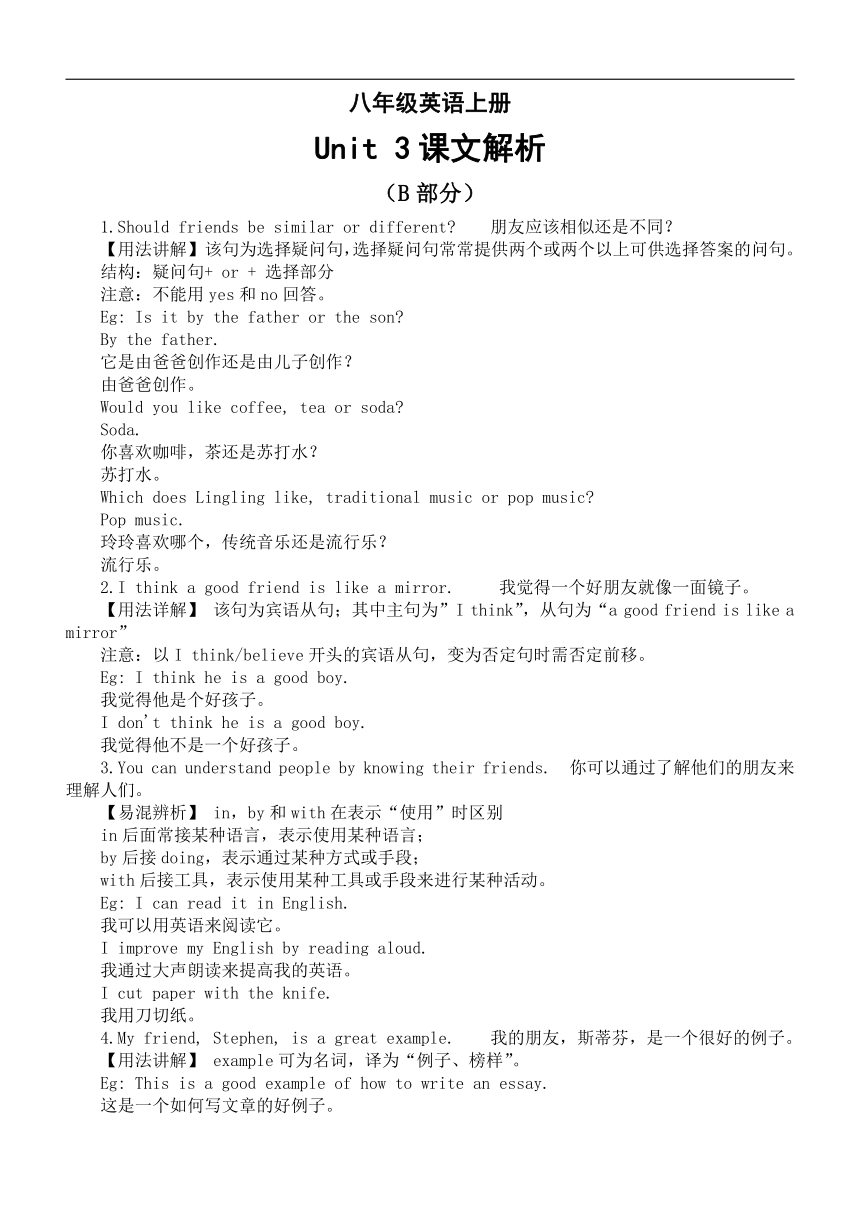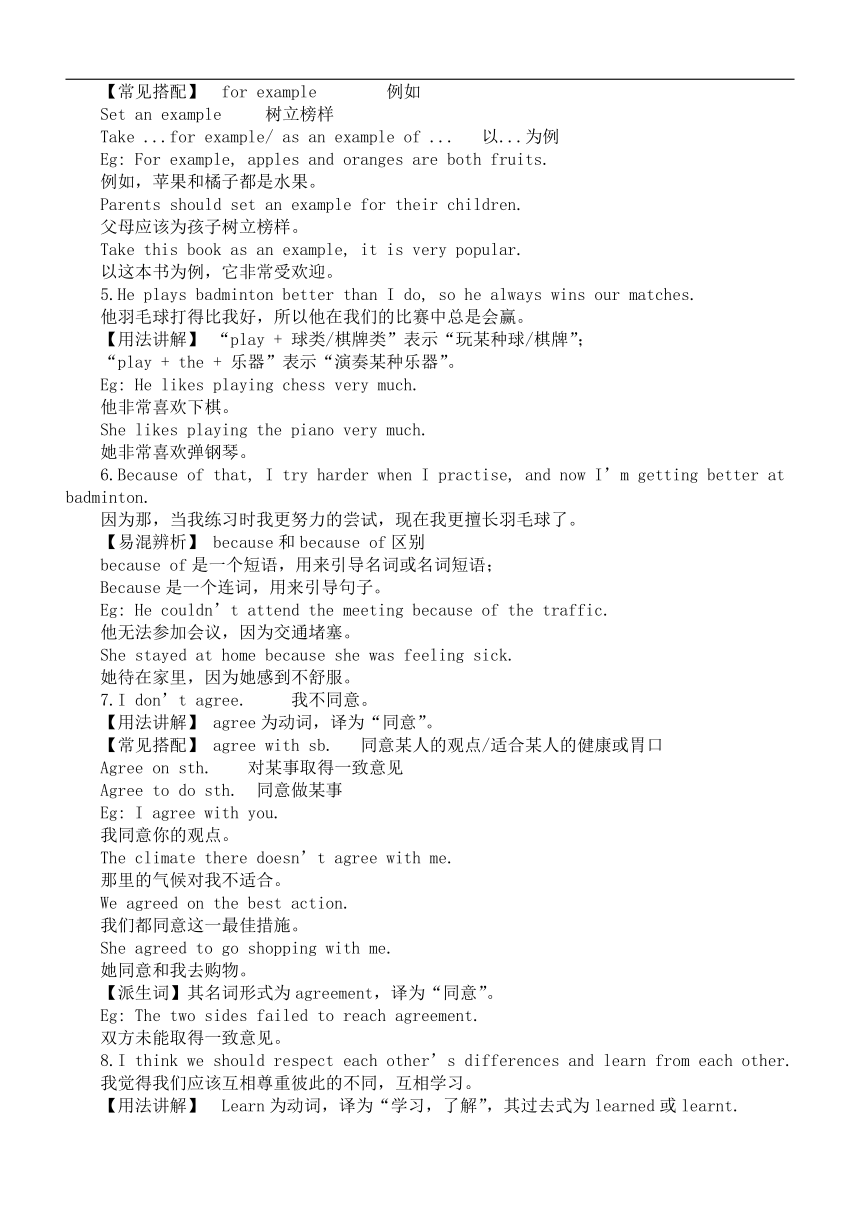Unit 3 Same or Different课文解析(B部分) 2025-2026学年人教版(2024)八年级英语上册
文档属性
| 名称 | Unit 3 Same or Different课文解析(B部分) 2025-2026学年人教版(2024)八年级英语上册 |  | |
| 格式 | docx | ||
| 文件大小 | 23.0KB | ||
| 资源类型 | 教案 | ||
| 版本资源 | 人教版 | ||
| 科目 | 英语 | ||
| 更新时间 | 2025-07-16 10:46:32 | ||
图片预览


文档简介
八年级英语上册
Unit 3课文解析
(B部分)
1.Should friends be similar or different 朋友应该相似还是不同?
【用法讲解】 该句为选择疑问句,选择疑问句常常提供两个或两个以上可供选择答案的问句。
结构:疑问句+ or + 选择部分
注意:不能用yes和no回答。
Eg: Is it by the father or the son
By the father.
它是由爸爸创作还是由儿子创作?
由爸爸创作。
Would you like coffee, tea or soda
Soda.
你喜欢咖啡,茶还是苏打水?
苏打水。
Which does Lingling like, traditional music or pop music
Pop music.
玲玲喜欢哪个,传统音乐还是流行乐?
流行乐。
2.I think a good friend is like a mirror. 我觉得一个好朋友就像一面镜子。
【用法详解】 该句为宾语从句;其中主句为”I think”,从句为“a good friend is like a mirror”
注意:以I think/believe开头的宾语从句,变为否定句时需否定前移。
Eg: I think he is a good boy.
我觉得他是个好孩子。
I don't think he is a good boy.
我觉得他不是一个好孩子。
3.You can understand people by knowing their friends. 你可以通过了解他们的朋友来理解人们。
【易混辨析】 in,by和with在表示“使用”时区别
in后面常接某种语言,表示使用某种语言;
by后接doing,表示通过某种方式或手段;
with后接工具,表示使用某种工具或手段来进行某种活动。
Eg: I can read it in English.
我可以用英语来阅读它。
I improve my English by reading aloud.
我通过大声朗读来提高我的英语。
I cut paper with the knife.
我用刀切纸。
4.My friend, Stephen, is a great example. 我的朋友,斯蒂芬,是一个很好的例子。
【用法讲解】 example可为名词,译为“例子、榜样”。
Eg: This is a good example of how to write an essay.
这是一个如何写文章的好例子。
【常见搭配】 for example 例如
Set an example 树立榜样
Take ...for example/ as an example of ... 以...为例
Eg: For example, apples and oranges are both fruits.
例如,苹果和橘子都是水果。
Parents should set an example for their children.
父母应该为孩子树立榜样。
Take this book as an example, it is very popular.
以这本书为例,它非常受欢迎。
5.He plays badminton better than I do, so he always wins our matches.
他羽毛球打得比我好,所以他在我们的比赛中总是会赢。
【用法讲解】 “play + 球类/棋牌类”表示“玩某种球/棋牌”;
“play + the + 乐器”表示“演奏某种乐器”。
Eg: He likes playing chess very much.
他非常喜欢下棋。
She likes playing the piano very much.
她非常喜欢弹钢琴。
6.Because of that, I try harder when I practise, and now I’m getting better at badminton.
因为那,当我练习时我更努力的尝试,现在我更擅长羽毛球了。
【易混辨析】 because和because of区别
because of是一个短语,用来引导名词或名词短语;
Because是一个连词,用来引导句子。
Eg: He couldn’t attend the meeting because of the traffic.
他无法参加会议,因为交通堵塞。
She stayed at home because she was feeling sick.
她待在家里,因为她感到不舒服。
7.I don’t agree. 我不同意。
【用法讲解】 agree为动词,译为“同意”。
【常见搭配】 agree with sb. 同意某人的观点/适合某人的健康或胃口
Agree on sth. 对某事取得一致意见
Agree to do sth. 同意做某事
Eg: I agree with you.
我同意你的观点。
The climate there doesn’t agree with me.
那里的气候对我不适合。
We agreed on the best action.
我们都同意这一最佳措施。
She agreed to go shopping with me.
她同意和我去购物。
【派生词】其名词形式为agreement,译为“同意”。
Eg: The two sides failed to reach agreement.
双方未能取得一致意见。
8.I think we should respect each other’s differences and learn from each other.
我觉得我们应该互相尊重彼此的不同,互相学习。
【用法讲解】 Learn为动词,译为“学习,了解”,其过去式为learned或learnt.
Eg: I learnt English at the age of six.
我六岁开始学英语。
【常见搭配】 learn to do sth. 学习做某事
Learn about sth. 了解某事
Learn ...from sb./sth. 从某人/某物中学到...
Learn by heart 背诵,记住
Eg: I want to learn to play the guitar.
我想学习弹吉他。
She learned about world history in her class.
她在课堂上学习了世界历史。
We can learn a lot from our mistakes.
我们从错误中学习到很多东西。
He learned the poem by heart for the recitation contest.
他为朗诵比赛背下了那首诗。
【易混辨析】 study和learn区别
study强调学习的过程,常用于科学、艺术和需要深入探讨的问题及学科;
learn侧重学习的成果,强调从不知到知、从不会到会的过程,通常用于获取知识和技能。
Eg: He is studying at Beijing University.
他在北京大学学习。
He learned traditional Chinese medicine from a famous Chinese doctor.
他在跟随译为著名的中国医生学习中医。
9.The average height of the students in the class is around 1.6 metres.
这个班学生的平均身高是1.6米。
【用法讲解】height为名词,译为“高度”。
Eg: The height of the building is ten meters.
这座楼的高度是十米。
【常见搭配】 in height 在高度上
Medium height 中等身高
At the height of ... 在...的顶峰
Eg: He is tall in height.
他的身高很高。
He is medium height.
他中等身高。
At the height of his fame, his every word was valued.
在他声名鼎盛之时,他的每句话都受到重视。
【派生词】high作形容词,还可译为“高的、高级的”。
Eg: The building is high.
这栋楼很高。
10.I don’t mind. 我不介意。
【用法讲解】mind可作动词,译为“介意”;mind也可为名词,译为“头脑、思考能力”。
Eg: Do you mind the noise here
这里的噪音会影响你吗?
She has a clear analytical mind.
她头脑清醒,善于分析。
【常见搭配】Change one’s mind 改变某人的主意
Make up one’s mind ((to do sth.) 下决心(做某事)
mind (one’s) doing sth. “介意(某人)做某事”
Mind + 从句
Eg: She made up her mind to improve her English. 她下定决心提高她的英语。
Would you mind my opening the door 你介意我开门吗?
I don’t mind if you have free time. 我不介意你是否有空闲时间。
Unit 3课文解析
(B部分)
1.Should friends be similar or different 朋友应该相似还是不同?
【用法讲解】 该句为选择疑问句,选择疑问句常常提供两个或两个以上可供选择答案的问句。
结构:疑问句+ or + 选择部分
注意:不能用yes和no回答。
Eg: Is it by the father or the son
By the father.
它是由爸爸创作还是由儿子创作?
由爸爸创作。
Would you like coffee, tea or soda
Soda.
你喜欢咖啡,茶还是苏打水?
苏打水。
Which does Lingling like, traditional music or pop music
Pop music.
玲玲喜欢哪个,传统音乐还是流行乐?
流行乐。
2.I think a good friend is like a mirror. 我觉得一个好朋友就像一面镜子。
【用法详解】 该句为宾语从句;其中主句为”I think”,从句为“a good friend is like a mirror”
注意:以I think/believe开头的宾语从句,变为否定句时需否定前移。
Eg: I think he is a good boy.
我觉得他是个好孩子。
I don't think he is a good boy.
我觉得他不是一个好孩子。
3.You can understand people by knowing their friends. 你可以通过了解他们的朋友来理解人们。
【易混辨析】 in,by和with在表示“使用”时区别
in后面常接某种语言,表示使用某种语言;
by后接doing,表示通过某种方式或手段;
with后接工具,表示使用某种工具或手段来进行某种活动。
Eg: I can read it in English.
我可以用英语来阅读它。
I improve my English by reading aloud.
我通过大声朗读来提高我的英语。
I cut paper with the knife.
我用刀切纸。
4.My friend, Stephen, is a great example. 我的朋友,斯蒂芬,是一个很好的例子。
【用法讲解】 example可为名词,译为“例子、榜样”。
Eg: This is a good example of how to write an essay.
这是一个如何写文章的好例子。
【常见搭配】 for example 例如
Set an example 树立榜样
Take ...for example/ as an example of ... 以...为例
Eg: For example, apples and oranges are both fruits.
例如,苹果和橘子都是水果。
Parents should set an example for their children.
父母应该为孩子树立榜样。
Take this book as an example, it is very popular.
以这本书为例,它非常受欢迎。
5.He plays badminton better than I do, so he always wins our matches.
他羽毛球打得比我好,所以他在我们的比赛中总是会赢。
【用法讲解】 “play + 球类/棋牌类”表示“玩某种球/棋牌”;
“play + the + 乐器”表示“演奏某种乐器”。
Eg: He likes playing chess very much.
他非常喜欢下棋。
She likes playing the piano very much.
她非常喜欢弹钢琴。
6.Because of that, I try harder when I practise, and now I’m getting better at badminton.
因为那,当我练习时我更努力的尝试,现在我更擅长羽毛球了。
【易混辨析】 because和because of区别
because of是一个短语,用来引导名词或名词短语;
Because是一个连词,用来引导句子。
Eg: He couldn’t attend the meeting because of the traffic.
他无法参加会议,因为交通堵塞。
She stayed at home because she was feeling sick.
她待在家里,因为她感到不舒服。
7.I don’t agree. 我不同意。
【用法讲解】 agree为动词,译为“同意”。
【常见搭配】 agree with sb. 同意某人的观点/适合某人的健康或胃口
Agree on sth. 对某事取得一致意见
Agree to do sth. 同意做某事
Eg: I agree with you.
我同意你的观点。
The climate there doesn’t agree with me.
那里的气候对我不适合。
We agreed on the best action.
我们都同意这一最佳措施。
She agreed to go shopping with me.
她同意和我去购物。
【派生词】其名词形式为agreement,译为“同意”。
Eg: The two sides failed to reach agreement.
双方未能取得一致意见。
8.I think we should respect each other’s differences and learn from each other.
我觉得我们应该互相尊重彼此的不同,互相学习。
【用法讲解】 Learn为动词,译为“学习,了解”,其过去式为learned或learnt.
Eg: I learnt English at the age of six.
我六岁开始学英语。
【常见搭配】 learn to do sth. 学习做某事
Learn about sth. 了解某事
Learn ...from sb./sth. 从某人/某物中学到...
Learn by heart 背诵,记住
Eg: I want to learn to play the guitar.
我想学习弹吉他。
She learned about world history in her class.
她在课堂上学习了世界历史。
We can learn a lot from our mistakes.
我们从错误中学习到很多东西。
He learned the poem by heart for the recitation contest.
他为朗诵比赛背下了那首诗。
【易混辨析】 study和learn区别
study强调学习的过程,常用于科学、艺术和需要深入探讨的问题及学科;
learn侧重学习的成果,强调从不知到知、从不会到会的过程,通常用于获取知识和技能。
Eg: He is studying at Beijing University.
他在北京大学学习。
He learned traditional Chinese medicine from a famous Chinese doctor.
他在跟随译为著名的中国医生学习中医。
9.The average height of the students in the class is around 1.6 metres.
这个班学生的平均身高是1.6米。
【用法讲解】height为名词,译为“高度”。
Eg: The height of the building is ten meters.
这座楼的高度是十米。
【常见搭配】 in height 在高度上
Medium height 中等身高
At the height of ... 在...的顶峰
Eg: He is tall in height.
他的身高很高。
He is medium height.
他中等身高。
At the height of his fame, his every word was valued.
在他声名鼎盛之时,他的每句话都受到重视。
【派生词】high作形容词,还可译为“高的、高级的”。
Eg: The building is high.
这栋楼很高。
10.I don’t mind. 我不介意。
【用法讲解】mind可作动词,译为“介意”;mind也可为名词,译为“头脑、思考能力”。
Eg: Do you mind the noise here
这里的噪音会影响你吗?
She has a clear analytical mind.
她头脑清醒,善于分析。
【常见搭配】Change one’s mind 改变某人的主意
Make up one’s mind ((to do sth.) 下决心(做某事)
mind (one’s) doing sth. “介意(某人)做某事”
Mind + 从句
Eg: She made up her mind to improve her English. 她下定决心提高她的英语。
Would you mind my opening the door 你介意我开门吗?
I don’t mind if you have free time. 我不介意你是否有空闲时间。
同课章节目录
